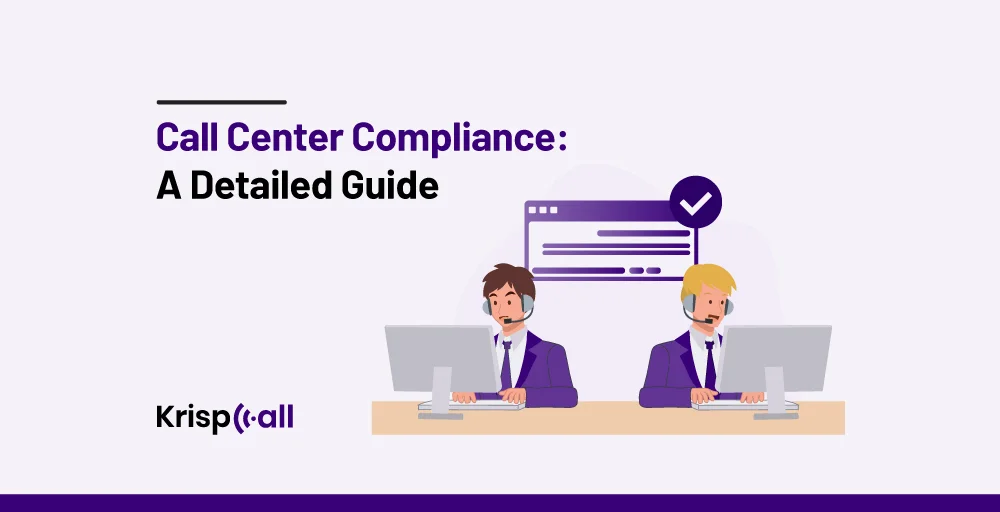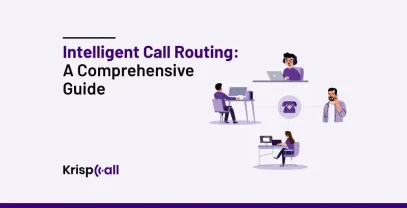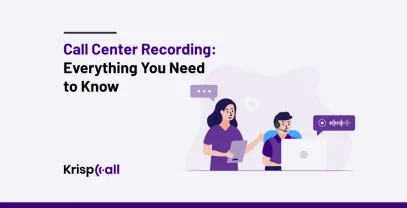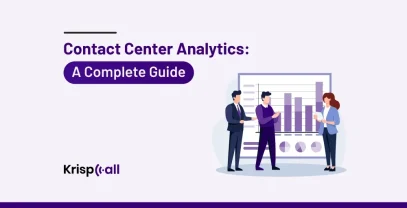Are you tired of navigating the darkness of call center compliance? 🌊
Concerned about costly penalties and legal dangers?
Call center compliance is the process of adhering to rules and specifications regulating the gathering, storing, and security of customer data that are provided by organizations or regulatory agencies. Controlling fraud and safeguarding data security and privacy are the goals of these rules.
No need to search anymore! We’ll simplify the details and arm you with crucial information in this quick guide. We cover everything from GDPR to TCPA. 💡🔍
Let’s get started!
🔑Key Points
- Call Center Compliance is essential for adhering to rules set by regulatory bodies like the FTC and FCC, ensuring legal and ethical standards.
- Call centers must comply with various regulations depending on their location and industry, such as HIPAA for healthcare-related data handling in the US.
- Compliant call center software and AI speech analytics tools help monitor and ensure adherence to regulations.
- Adherence to regulations such as TCPA helps prevent nuisance contacts, respect consumer preferences, and avoid unsolicited calls.
- Compliance with noise regulations at work safeguards agents’ hearing health in loud call center environments.
What is Call Center Compliance?
Call center compliance refers to the strict adherence to rules and regulations set by regulatory bodies or organizations like the Federal Trade Commission (FTC) and the Federal Communications Commission(FCC) within the context of call centers. These rules can be internal policies or external standards established by regulatory authorities.

Compliance is crucial for maintaining legal and ethical standards, transparent communication practices, and safeguarding customer data and privacy.
Why is compliance important in a call center?
Call center compliance is crucial for several reasons:
- Avoids hefty fines and legal trouble: Strict fines are imposed by regulatory agencies for non-compliance. Unwanted calls, deceptive sales practices, and data security breaches can all have a major negative financial impact on the business.
- Protects your reputation: Consumers demand fair treatment from contact centers and trust them with their personal information. Compliance blunders, such as data breaches or intrusive phone calls, may seriously harm your company’s reputation and lose consumer confidence.
- Build customer trust: Customers are more inclined to trust a firm when they are certain that their data is protected and that calls are handled responsibly. Loyalty is strengthened, and excellent customer encounters are fostered by compliance.
- Ensure fair business practices: Regulations on compliance avoid misleading advertising and encourage sincere communication. This keeps customers safe from deceit and levels the playing field for companies.
- Boosts employee morale: Agents may be certain they are abiding by ethical standards when they work in a compliant workplace. Higher employee satisfaction and maybe decreased turnover rates might result from this.
- Minimizes risk: Compliance reduces the possibility of data breaches, and legal action, and harm to one’s reputation. Call centers may run more safely and avoid avoidable problems by adhering to the guidelines.
What are the types of call center compliance?
Call center compliance covers several crucial topics to guarantee moral behavior, legal compliance, and consumer safety.

PCI DSS compliance (Protecting Credit Card)
The Payment Card Industry Data Security Standard (PCI DSS) must be followed by call centers that process credit card transactions. To stop call center fraud and safeguard consumer financial information, this standard guarantees the safe processing, storing, and transfer of credit card information.
Data Protection Compliance (Protecting Customer Data)
Protecting client data is the responsibility of call centers. Respecting data protection laws and regulations is part of compliance. For instance, stringent guidelines for managing personal data are mandated by the General Data Protection Regulation (GDPR) in the European Union.
OFCOM Compliance (Not Generating Nuisance Calls)
Call centers need to refrain from making unnecessary calls that irritate or disrupt the recipients.
Respectful communication is ensured by following OFCOM regulations, which include stopping unsolicited calls.
Noise at work regulations (Protecting hearing loss)
Agents at call centers are employed in loud settings. Adherence to noise rules at work guarantees that hearing protection measures are implemented.
For the well-being of the agent, appropriate noise control and protection gear are crucial.
10 Actual Compliance Regulations for Call Center Compliance
The laws governing contact center compliance might differ greatly depending on the sector and region. The majority of the real and frequent compliance rules that call centers need to go by to be compliant are listed below; these laws mostly concern outbound call center operations.
1. Payment Card Industry Data Security Standard (PCI DSS)
The purpose of the Payment Card Industry Data Security Standard (PCI DSS) is to safeguard sensitive payment card data during transactions by forbidding contact centers from logging or keeping this data.
2. General Data Protection Regulation (GDPR)
Organizations doing business within the European Union or managing the personal data of EU residents elsewhere in the world are subject to the General Data Protection Regulation (GDPR). Before recording a call, contact centers must get the agreement of the caller and show a valid justification.
3. Telephone Consumer Protection Act (TCPA)
The TCPA prohibits telemarketing calls as well as the use of fax machines, SMS text messaging, fake or prerecorded voicemail, and automatic dialing systems. It also needs prior express authorization for some call types and lays forth procedures for keeping a Do-Not-Call list.
4. Do Not Call Registry (DNC)
A list of phone numbers known as the Do Not Call Registry (DNC) is where people can register to choose not to receive unsolicited telemarketing calls. Nations with national DNC lists include the US, Canada, India, and Singapore. Serious fines can result from breaking DNC requirements.
5. Telemarketing Sales Rule(TSR)
The TSR includes regulations for deceptive representations, disclosures, and billing methods and relates to telemarketing activities. It establishes precise guidelines for getting informed permission for invoicing, enforces the National Do Not Call Registry, and places restrictions on when telemarketers can contact customers.
6. General Data Protection Regulation (GDPR)
One of the strictest privacy and security regulations in the world is the GDPR. Despite having been written and approved by the EU, it imposes duties on organizations worldwide, provided that they target or gather information about individuals within the EU. Strict guidelines on permission, data security, and people’s rights over their data are all included.
7. The Health Insurance Portability and Accountability Act (HIPAA)
In the United States, contact centers managing patient data on behalf of healthcare organizations and providers are required to abide by the Health Insurance Portability and Accountability Act (HIPAA), which establishes guidelines for the confidentiality and security of sensitive patient health data.
8. Federal Trade Commission (FTC) Regulations
Laws that shield customers from unfair and misleading commercial practices are enforced by the FTC. This covers call centers’ compliance with truth-in-advertising guidelines, privacy and data security requirements, and laws against unethical business activities.
9. The Fair Debt Collection Practices Act (FDCPA)
A U.S. federal legislation known as the Fair Debt Collection Practices Act (FDCPA) governs the conduct of third-party debt collectors who pursue debts on behalf of another individual or organization to guarantee moral, fair, and non-abusive debt collection methods.
10. Call Recording and Monitoring Consent
Call centers are also required by law in nations including the United States, Canada, and Australia to get permission from one or both parties (customers and call center operators) to record and monitor calls. Customers are also free to refuse this service if they find it disturbing.
What are the industry standards for call center compliance?
Call center compliance rules can be better understood by looking at a few well-known instances, even if the industry standard might vary depending on the sector and area.

Protecting customer financial data
Compliance with the Payment Card Industry Data Security Standard (PCI DSS) is intended to stop contact centers from storing sensitive cardholder data, such as complete magnetic stripe data, PINs, and CVV2 numbers. This lessens the possible harm in the unlikely event that the information is ever compromised by guaranteeing that, for example, consumer credit card data is never retained in its entirety.
Gaining Consent for call recording
A recorded message noting that “calls will be recorded for training purposes” is often heard when consumers call a call center. By staying on the line, callers consent to the firms recording them, since this guarantees that anybody contacting the call center is aware that they are being recorded. Agents may also say that as soon as a link is established, calls are recorded.
Guarding protected health information
Health Insurance Portability and Accountability Act (HIPAA) in the United States is an excellent example of an industry standard, even if different nations have different regulations regarding the protection of sensitive health information. Patients are shielded from fraud and theft thanks to this, which also prevents consumer information from being exposed outside of certain parameters.
Protecting customers from nuisance contacts
The US Telephone Consumer Protection Act (TCPA) is another excellent illustration of an industry standard. It regulates the use of telephones or automated call devices to recruit current or potential consumers. By doing this, contact centers are able to avoid contacting clients who have requested not to be contacted by phone, contacting them during unsociable hours, and much more.
What is the call center compliance checklist?
A call center compliance checklist is a valuable tool that helps call centers maintain legal adherence, protect customer data, and uphold ethical standards. Let’s explore some essential items that should be part of such a checklist:
Regulatory Compliance
- Determine Relevant Regulations: Recognize the laws that, depending on your call center’s region and sector, are relevant to it. TCPA (US), GDPR (EU), PCI DSS, and HIPAA (US) are a few examples.
- Examine Policies and Procedures: Make sure your contact center has written policies outlining how it will abide by each law.
- Call Recording: As required by law, confirm that you have the consumers’ permission to record calls.
- Data security: Verify that you have put strong safeguards in place for your data, such as encryption, access limits, and safe disposal procedures.
- Do Not Call (DNC) Lists: To prevent unwanted calls, make sure you are cleansing your calling lists against DNC registers.
Internal Compliance
- Customer Service Standards: Ensure that there are written guidelines for how agents should behave during calls, including expectations for timeliness, civility, and helpfulness.
- Data Security Practices: Examine your internal processes and make sure that security best practices are followed while managing sensitive consumer data.
- Call Scripting and Procedures: Ensure that agents are well-versed in how to handle various call types, such as information gathering, product offers, and customer service.
- Agent Education: Assure that agents have in-depth instruction on pertinent laws, corporate guidelines, and industry best practices about customer service.
Monitoring and Auditing
- Call Monitoring: Establish a mechanism to sporadically listen in on calls to gauge how well agents are following compliance policies and scripts.
- Security Audits: To find weaknesses in your systems, do frequent penetration tests and security audits.
- Data Breach Response: Clearly define your strategy for handling data breaches, including how to notify affected parties and comply with legal reporting obligations.
Best Practices for Ensuring Call Center Compliance
It is possible to mitigate the negative effects of non-compliance for both inbound and outbound contact centers by adhering to these best practices:
- Developing a compliance policy: Developing and implementing a thorough compliance policy, making it widely available to all employees, and stressing to them the value of adhering to it are the first steps in guaranteeing regulatory compliance in a contact center.
- Providing ongoing agent training: The next stage is to provide agents with regular call center compliance training and coaching so they are fully aware of the current compliance policy, understand how to conduct customer interactions, and know how to collect and handle sensitive customer data in a way that ensures compliance.
- Utilizing call center scripts: One of the most effective methods to keep compliance in both inbound and outbound customer interactions is to use contact center scripts. Call center scripts are pre-written instructions and replies that operators may use to stay compliant and navigate through consumer engagements.
- Using compliant call center software: When agents in outbound contact centers use auto dialer software tools and are primarily engaged in making outbound sales calls, it is very important to use call center compliance software. In order to avoid call centers from breaking DNC standards, auto dialer solutions must enable DNC compliance. This ensures that the dialer does not originate outbound calls to the numbers listed in the Do Not Call Registry.
- Leveraging AI speech analytics tools:Speech analytics and speech-to-text analytics software for contact centers automate the whole call monitoring process, assisting in compliance management. For example, VoiceSpin’s AI Speech Analyzer automatically analyzes all of your incoming and outgoing calls for compliance monitoring, saving managers and supervisors hours of time and effort by doing it manually.
What are the latest trends in call center compliance regulations?
Advances in technology, increased concerns about data privacy, and an increasing focus on consumer protection are some of the elements that are driving the ongoing evolution of call center compliance requirements.
Below are a few of the advances in technology, increased concerns about data privacy, and an increasing focus on consumer protection are some of the elements that are driving the ongoing evolution of call center compliance requirements. Watch out for the following current trends:

Focus on Data Privacy
We can anticipate more stringent data privacy laws in the future, thanks to laws like the GDPR and other rules that raise the standard. Stronger client permission procedures, more openness over data usage, and restrictions on data collecting might all be part of this.
Impact of AI and Automation
Regulations can need to change to address concerns like bias in AI algorithms, transparency in automated interactions, and guaranteeing human oversight for crucial activities as AI and automation become more commonplace in contact centers.
Remote Work and Cloud Security
Strong cloud security measures are required to protect client data accessible from several places due to the growth of remote workforces. Stricter data encryption procedures, secure communication methods, and access restrictions can be the focus of regulations.
Omnichannel Compliance
Compliance must include each of these touchpoints as client interactions are becoming more multichannel (phone, chat, social media). Regulations may mandate that data security procedures be followed consistently and that all communication channels follow set communication guidelines.
Increased Scrutiny and Enforcement
It is probable that regulatory authorities will increase their vigilance in enforcing current restrictions and may implement more severe penalties for non-compliance. Contact centers can anticipate more regular audits and a stronger focus on exhibiting a compliance culture.
KrispCall: The Key to Ensuring Compliance in Modern Call Center
Call centers are under growing pressure to maintain stringent regulatory standards while providing great customer service in today’s fast-paced corporate climate. Developing trust with clients, safeguarding their private information, and maintaining the integrity of communication channels are all important aspects of compliance.

Here’s where KrispCall steps in as a key player, providing contemporary contact centers with the resources they need to successfully negotiate the murky waters of compliance regulations.
Secure Communication
Ensuring privacy and safeguarding client data is fundamental to compliance. KrispCall protects sensitive data by using secure data storage procedures and end-to-end encryption. KrispCall protects all data from unwanted access, preserving the principles of privacy and confidentiality, whether it be credit card information, personal identifiers, or private chats.
Real-Time Monitoring and Reporting
KrispCall provides real-time reporting and monitoring features that are essential for upholding compliance. Supervisors can keep an eye on calls as they occur, making sure that agents follow protocol and legal requirements. Moreover, call logs, recordings, and performance indicators may be easily retrieved thanks to KrispCall’s extensive reporting capabilities, which makes it easier to prove compliance in audits and reviews.
Enhance Training and Quality Assurance
Quality control and continual education are necessary for the continuous process of compliance. By giving agents access to call logs and analytics, which can be utilized to identify areas for development and best practices, KrispCall helps with agent training. This guarantees that all contacts are carried out in a way that complies with compliance rules in addition to improving the customer experience.
Scalability for Future Compliance Needs
The systems and procedures used to enforce compliance must change along with the regulations. Because KrispCall is designed to be scalable, contact centers can readily adjust to new laws without having to worry about their business being disrupted. This progressive strategy guarantees that contact centers maintain compliance even when new regulations and guidelines are introduced.
Conclusion
Call center compliance is essential for maintaining moral and legal obligations, safeguarding client information, avoiding fines, and preserving goodwill. Respecting laws like the TCPA and GDPR as well as industry norms like PCI DSS and HIPAA is crucial.
To ensure compliance, it is essential to have a thorough policy, provide continuous training, and leverage technology like AI voice analytics tools.
Call centers need to be alert and flexible to satisfy future regulatory requirements given the constantly changing regulatory landscape. KrispCall and similar solutions provide contemporary contact centers with the capabilities they need to successfully manage the intricacies of compliance rules.
FAQs
How should I handle sensitive customer data?
Using passwords and encryption is one of the most crucial ways to safeguard sensitive client information sent via email. The technique of encrypting an email jumbles its contents so that only the intended receiver can decipher it.
What information can I Collect from customers during a call?
Gathering the most basic data would be significantly easier for a business-to-consumer (B2C) organization. Ascertain their name, gender, age, occupation, place of residence, phone number, email address, and family income. This ought to be sufficient for creating a basic client profile and contacting them as needed.
What is compliance in quality in BPO?
Compliance is the act of following rules, guidelines, and protocols established by your organization, sector, or government. Published industry standards, state and federal legislation, and internal policies are all covered by this method.
Adherence Vs Compliance Call Center: What are the Differences?
Adherence is about following the exact timing of your exact schedule whereas compliance is focusing on completing your assigned workload within the timeframe you are assigned.





